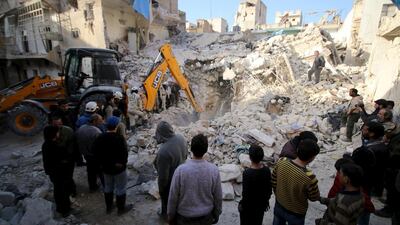Abu Dhabi // Turkey shelled a Kurdish militia in northern Syria for a second day on Sunday and Russia continued to heavily bomb rebel groups, raising further doubts for a temporary truce.
The fighting comes as Ankara and Riyadh look to prevent the fall of rebels in Aleppo province and their encirclement by forces led by Iran and backed by Russian airpower, with speculation growing they may intervene directly.
The Saudi foreign minister said on Sunday that Russia’s military support for the Syrian regime – which has pushed rebels to the brink of their worst defeat since the uprising began five years ago – would fail to save Bashar Al Assad.
Adel Al Jubeir urged Moscow to “end its air operations against the moderate Syrian opposition” adding that it was impossible for Mr Al Assad “a man behind the killing of 300,000 innocent people” to remain in power.
Saudi Arabia sent fighter jets to Turkey’s Incirlik airbase near the Syrian border over the weekend to increase its role in the US-led anti-ISIL coalition.
But Mr Al Jubeir reiterated Riyadh’s position that any deployment of Saudi special forces into Syria to fight ISIL would depend on decisions by the US to formulate a strategy.
“The Kingdom’s readiness to provide special forces to any ground operations in Syria is linked to a decision to have a ground component to this coalition against Daesh in Syria – this US-led coalition – so the timing is not up to us,” Mr Al Jubeir said in Riyadh.
Saudi Arabia and Bahrain have said they are willing to involve their special forces in a coalition ground operation against ISIL.
Minister of State for Foreign Affairs, Dr Anwar Gargash, last week reaffirmed the UAE’s support for forces fighting ISIL and said that any coalition ground deployment should not be large in size and feature only small numbers of special forces.
“With regards to timing of the mission or size of troops, this has yet to be worked out,” Mr Al Jubeir said on Sunday.
On Friday, US secretary of state Ash Carter said Gulf officials told him they were willing to provide special forces that would work with US special forces in eastern Syria to “organise and enable” local rebels to retake Raqqa city from ISIL, the group’s self-declared capital.
The continued fighting on the ground and diplomatic war of words came after a plan was agreed on Friday between the international supporters of both sides in the conflict for a temporary truce that is set to begin at the end of the week.
The prospects for the “cessation of hostilities” are slim, and neither the Assad regime nor Syrian rebel groups have signed on. Riad Hijab, a senior opposition official and head of the High Negotiation Committee umbrella group said at the Munich Security Conference on Sunday, “we have gotten used to conferences and hope put into words but what we need is action, and the action I see is that Russia is killing Syrian civilians.”
He would not say whether rebels would sign up to the temporary cessation deal.
Critics say the terms of the truce, which allows for the continued targeting of ISIL, Al Qaeda’s Jabhat Al Nusra and “associated groups”, will allow Russia to continue targeting the mainstream opposition because it claims all rebels are extremists.
The Kremlin said on Sunday that Russia would continue bombing ISIL and “other terroristic organisations”.
The US president Barack Obama spoke with Russian president Vladimir Putin on Sunday to discuss the truce deal and “stress the importance of rapidly implementing humanitarian access to besieged areas of Syria”, the White House said. “In particular, President Obama emphasised the importance now of Russia playing a constructive role by ceasing its air campaign against moderate opposition forces in Syria.”
Meanwhile Turkish military units fired howitzers from Turkey at the YPG Kurdish militia around the Syrian town of Azaz, according to Turkish state media. The YPG are the militia of the Democratic Union Party, which Ankara considers the Syrian branch of the PKK, a separatist Kurdish party that it, as well as the US, consider a terrorist group, and has waged an insurgency against the Turkish state for most of the last 30 years.
The attack on the YPG drew condemnation from the US, which has backed the Kurdish fighters with air strikes, arms and training, as Washington sees it as the most competent and trustworthy Syrian group in the fight against ISIL. Tension over the YPG between the Nato allies has added another element of confusion to the efforts against ISIL.
On Saturday night, the US state department spokesman John Kirby urged Turkey to stop the shelling, and also urged the YPG to “not to take advantage of a confused situation by seizing new territory”.
The US-backed YPG has also now allied with Russia, and has been supported by Russian air strikes as its fighters moved west of the Euphrates river towards Azaz, a key border crossing for Syrian rebels. Ankara fears the group is planning to seize territory to create an autonomous Kurdish region along Turkey’s border with Syria.
YPG forces also took the Menagh airbase in Syria from Turkish-backed rebels, which Turkey has demanded the YPG withdraw from. Syrian officials called the Turkish artillery fire into Syria a violation of sovereignty and called on the United Nations to intervene.
Turkish deputy prime minister Yalcin Akdogan said the Kurdish advance had crossed a “red line”. “We will take every necessary step to ensure an environment that guarantees Turkey’s security, an environment without Daesh, the Syrian regime or the PYD,” he said.
tkhan@thenational.ae

